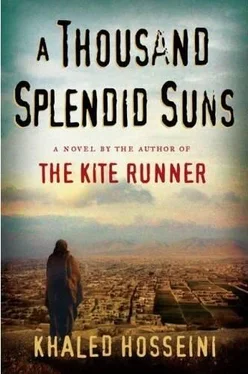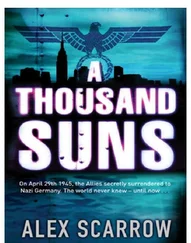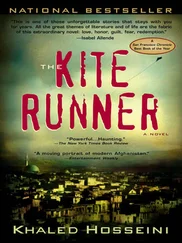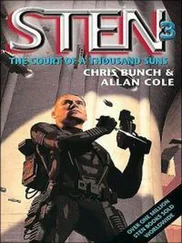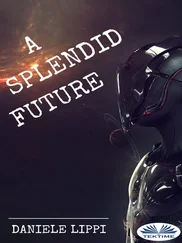All around her now, Laila saw the consequences of the recent fighting whose sounds she'd heard from the house. Homes that lay in roofless ruins of brick and jagged stone, gouged buildings with fallen beams poking through the holes, the charred, mangled husks of cars, upended, sometimes stacked on top of each other, walls pocked by holes of every conceivable caliber, shattered glass everywhere. She saw a funeral procession marching toward a mosque, a black-clad old woman at the rear tearing at her hair. They passed a cemetery littered with rock-piled graves and ragged shaheed flags fluttering in the breeze.
Laila reached across the suitcase, wrapped her fingers around the softness of her daughter's arm.
AT THE Lahore Gate bus station, near Pol Mahmood Khan in East Kabul, a row of buses sat idling along the curbside. Men in turbans were busy heaving bundles and crates onto bus tops, securing suitcases down with ropes. Inside the station, men stood in a long line at the ticket booth. Burqa-clad women stood in groups and chatted, their belongings piled at their feet. Babies were bounced, children scolded for straying too far.
Mujahideen militiamen patrolled the station and the curbside, barking curt orders here and there. They wore boots, pakols, dusty green fatigues. They all carried Kalashnikovs.
Laila felt watched. She looked no one in the face, but she felt as though every person in this place knew, that they were looking on with disapproval at what she and Mariam were doing.
"Do you see anybody?" Laila asked.
Mariam shifted Aziza in her arms. "I'm looking."
This, Laila had known, would be the first risky part, finding a man suitable to pose with them as a family member. The freedoms and opportunities that women had enjoyed between 1978 and 1992 were a thing of the past now – Laila could still remember Babi saying of those years of communist rule, It's a good time to be a woman in Afghanistan, Laila. Since the Mujahideen takeover in April 1992, Afghanistan 's name had been changed to the Islamic State of Afghanistan. The Supreme Court under Rabbani was filled now with hard-liner mullahs who did away with the communist-era decrees that empowered women and instead passed rulings based on Shari'a, strict Islamic laws that ordered women to cover, forbade their travel without a male relative, punished adultery with stoning. Even if the actual enforcement of these laws was sporadic at best. But they'd enforce them on us more, Laila had said to Mariam, if they weren't so busy killing each other. And us.
The second risky part of this trip would come when they actually arrived in Pakistan. Already burdened with nearly two million Afghan refugees, Pakistan had closed its borders to Afghans in January of that year. Laila had heard that only those with visas would be admitted. But the border was porous – always had been – and Laila knew that thousands of Afghans were still crossing into Pakistan either with bribes or by proving humanitarian grounds – and there were always smugglers who could be hired. We'll find a way when we get there, she'd told Mariam.
"How about him?" Mariam said, motioning with her chin.
"He doesn't look trustworthy."
"And him?"
"Too old. And he's traveling with two other men."
Eventually, Laila found him sitting outside on a park bench, with a veiled woman at his side and a little boy in a skullcap, roughly Aziza's age, bouncing on his knees. He was tall and slender, bearded, wearing an open-collared shirt and a modest gray coat with missing buttons.
"Wait here," she said to Mariam. Walking away, she again heard Mariam muttering a prayer.
When Laila approached the young man, he looked up, shielded the sun from his eyes with a hand.
"Forgive me, brother, but are you going to Peshawar?"
"Yes," he said, squinting.
"I wonder if you can help us. Can you do us a favor?"
He passed the boy to his wife. He and Laila stepped away.
"What is it, hamshira?
She was encouraged to see that he had soft eyes, a kind face.
She told him the story that she and Mariam had agreed on. She was a biwa, she said, a widow. She and her mother and daughter had no one left in Kabul. They were going to Peshawar to stay with her uncle.
"You want to come with my family," the young man said.
"I know it's zahmat for you. But you look like a decent brother, and I-"
"Don't worry, hamshira. I understand. It's no trouble. Let me go and buy your tickets."
"Thank you, brother. This is sawab, a good deed. God will remember."
She fished the envelope from her pocket beneath the burqa and passed it to him. In it was eleven hundred afghanis, or about half of the money she'd stashed over the past year plus the sale of the ring. He slipped the envelope in his trouser pocket.
"Wait here."
She watched him enter the station. He returned half an hour later.
"It's best I hold on to your tickets," he said. The bus leaves in one hour, at eleven. We'll all board together. My name is Wakil. If they ask – and they shouldn't – I'll tell them you're my cousin."
Laila gave him their names, and he said he would remember.
"Stay close," he said.
They sat on the bench adjacent to Wakil and his family's. It was a sunny, warm morning, the sky streaked only by a few wispy clouds hovering in the distance over the hills. Mariam began feeding Aziza a few of the crackers she'd remembered to bring in their rush to pack. She offered one to Laila.
"I'll throw up," Laila laughed. "I'm too excited."
"Me too."
"Thank you, Mariam."
"For what?"
"For this. For coming with us," Laila said. "I don't think I could do this alone."
"You won't have to."
"We're going to be all right, aren't we, Mariam, where we're going?"
Mariam's hand slid across the bench and closed over hers. "The Koran says Allah is the East and the West, therefore wherever you turn there is Allah's purpose."
"Bov!" Aziza cried, pointing to a bus. "Mayam, bov!"
"I see it, Aziza jo," Mariam said. "That's right, bov. Soon we're all going to ride on a bov. Oh, the things you're going to see."
Laila smiled. She watched a carpenter in his shop across the street sawing wood, sending chips flying. She watched the cars bolting past, their windows coated with soot and grime. She watched the buses growling idly at the curb, with peacocks, lions, rising suns, and glittery swords painted on their sides.
In the warmth of the morning sun, Laila felt giddy and bold. She had another of those little sparks of euphoria, and when a stray dog with yellow eyes limped by, Laila leaned forward and pet its back.
A few minutes before eleven, a man with a bullhorn called for all passengers to Peshawar to begin boarding. The bus doors opened with a violent hydraulic hiss. A parade of travelers rushed toward it, scampering past each other to squeeze through.
Wakil motioned toward Laila as he picked up his son.
"We're going," Laila said.
Wakil led the way. As they approached the bus, Laila saw faces appear in the windows, noses and palms pressed to the glass. All around them, farewells were yelled.
A young militia soldier was checking tickets at the bus door.
"Bov!" Aziza cried.
Wakil handed tickets to the soldier, who tore them in half and handed them back. Wakil let his wife board first. Laila saw a look pass between Wakil and the militiaman. Wakil, perched on the first step of the bus, leaned down and said something in his ear. The militiaman nodded.
Laila's heart plummeted.
"You two, with the child, step aside," the soldier said.
Laila pretended not to hear. She went to climb the steps, but he grabbed her by the shoulder and roughly pulled her out of the line. "You too," he called to Mariam. "Hurry up! You're holding up the line."
Читать дальше
